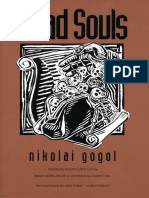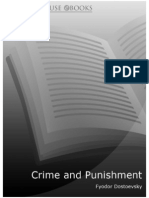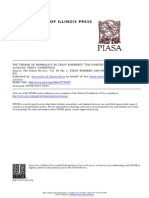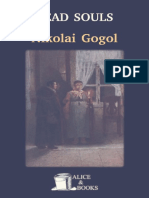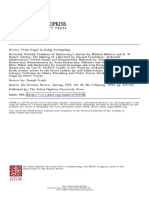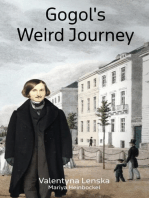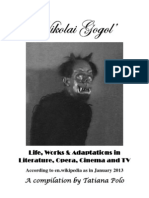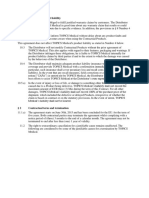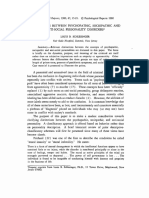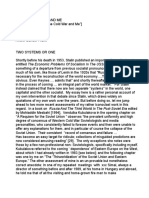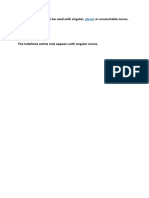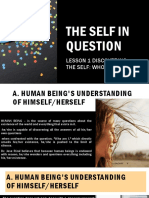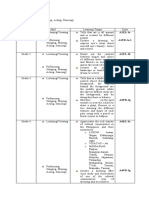Maxim Gorky
Maxim Gorky
Uploaded by
Maksim PlebejacCopyright:
Available Formats
Maxim Gorky
Maxim Gorky
Uploaded by
Maksim PlebejacOriginal Description:
Copyright
Available Formats
Share this document
Did you find this document useful?
Is this content inappropriate?
Copyright:
Available Formats
Maxim Gorky
Maxim Gorky
Uploaded by
Maksim PlebejacCopyright:
Available Formats
Maxim Gorky: In Search of a Synthesis
Author(s): Alexander Kaun
Source: The Slavonic and East European Review, Vol. 17, No. 50 (Jan., 1939), pp. 429-444
Published by: the Modern Humanities Research Association and University College London, School of
Slavonic and East European Studies
Stable URL: http://www.jstor.org/stable/4203499 .
Accessed: 14/06/2014 10:29
Your use of the JSTOR archive indicates your acceptance of the Terms & Conditions of Use, available at .
http://www.jstor.org/page/info/about/policies/terms.jsp
.
JSTOR is a not-for-profit service that helps scholars, researchers, and students discover, use, and build upon a wide range of
content in a trusted digital archive. We use information technology and tools to increase productivity and facilitate new forms
of scholarship. For more information about JSTOR, please contact support@jstor.org.
Modern Humanities Research Association and University College London, School of Slavonic and East
European Studies are collaborating with JSTOR to digitize, preserve and extend access to The Slavonic and
East European Review.
http://www.jstor.org
This content downloaded from 194.29.185.145 on Sat, 14 Jun 2014 10:29:59 AM
All use subject to JSTOR Terms and Conditions
MAXIM GORKY
IN SEARCH OF A SYNTHESIS
FROMthe very outset Maxim Gorky showed a desire to be not only
an artist but also a teacher. During the forty-five years of his
literary activity he composed, in addition to the twenty odd volumes
of fiction, drama, and memoirs, a quantity of essays, editorials, and
speeches on various subjects. It is primarilyas publicist and literary
critic, both in the press and in his voluminous correspondence,
that Gorky displayed his tendency not only to create but also to
explain and exhort, to label and pass judgment. As a self-made
and self-educatedman, he formed his views, especially his theoretical
views, laboriously, and with much vacillation and groping. A case
in point is his attitude toward Realism and Romanticism.
Gorky records a remark by Tolstoy: " As to Romanticism, that
comes from one's fear to look truth straight in the eye."' Gorky's
early writings, naive flights into the legendary and fantastic, did
betray such a fear on the part of one who more than any of his
fellow-writershad gazed into the eye of factual truth. He had just
emerged from the lower depths of life, his bruises from contact with
the reality of stevedores and tramps were still raw, and his first
ventures with the pen had a decidedly escapist air. Korolenko,
whose mentorship and guidance Gorky fully acknowledgedin later
days, was keen enough to detect a genuine robustness beneath the
hyperbolic veneer of the beginner. On reading Gorky's "Old
Woman Izergil," Korolenko observed:
" A queer tale!
Why, it is Romanticism, which has been
dead for a long time. I doubt very much whether this Lazarus
deserves resurrecting. It seems to me that you are singing in
the wrong key. You are a Realist, not a Romanticist. You
are a Realist."2
KorolenkopersuadedGorky to write from his actual observations
and experiences. He was delighted to publish in his review Gorky's
first realistic story, "Chelkash." Gorky recalls that on that
occasion Korolenkoremarked:
" You see, I've told you that you are a Realist! " Then he
paused, and added with a grin: " But at the same time a
Romanticist ! "3
1 Lev Sobranie sochineniy, V., XVI, p. 278 (Kniga).
2 "V. G.Tolstoy."
Korolenko." Ibid., pp. 221-22.
3 Ibid.,
p. 226.
429
This content downloaded from 194.29.185.145 on Sat, 14 Jun 2014 10:29:59 AM
All use subject to JSTOR Terms and Conditions
430 THE SLAVONIC REVIEW.
Indeed, the opening paragraph of " Chelkash" was written in
the upper notes of Gorky's early rhapsodies. For years to come
Gorky retained the duality noticed by Korolenko. One recalls
how often Chekhov drew his attention to the discrepancy between
the realistic contents of his stories and the lack of reserve in his
descriptive passages and in the choice of words.4 Along with his
stories from every-day life, written in the traditional vein of Russian
Realism, Gorky proceeded to publish spicy allegories, such as
"The Song of the Falcon," " The Song of the Stormy Petrel,"
written in a declamatory metric prose.
This duality appeared even more striking in his journalistic
articles and in some private letters of the period preceding I90o5
As a feuilletonist on several newspapers in the Volga region during
the late 89go's,Gorky now championed the Realism of Balzac, now
the poetry of the early Russian Symbolists, Balmont and Bryusov,
now the ultra-Impressionismof the painter Vrubel. In January,
I9oI, he agreed to contribute to the Symbolist miscellany, Northern
Flowers, telling in a letter to Bryusov of his desire to support the
maligned Symbolists, since they were treated like "literary out-
casts."5 But one month later, after the inauguration by the
authorities of drastic measures against university students, including
forced recruitmentinto the army as privates, Gorky refused to have
any commercewith those who dwell in an ivory tower. In a note to
the same Bryusov he vehemently protested against the indifferentism,
aloofness and preciosity of the Symbolist group, reproaching even
his Realist friend, Ivan Bunin, for not whetting his fine talent into
a dagger.6
About the same time Gorky was expressing his admiration for
Anton Chekhov, both in his published articles and in his letters to
the older author. He took issue with the leading critics of the time,
notably Mikhailovsky, who accused Chekhov of being cold and
devoid of any "message." He praised Chekhov's "humane
objectivity," his realistic portrayal of life, his " unembellished"
individuals, and the implied social message of his picture of wingless
actuality.7 But in a letter to Chekhov, written almost simul-
taneously, Gorky said:
Have read your " Lady with the Dog." Do you know
what you are doing? You are slaying Realism. And you
4
Especially in his letters to Gorky, of 3 December, 1898, and of 3 January,
1899, in Pis'ma A. P. Chekhova,V. V, pp. 477-78 and 480.
5 Letter to
Bryusov, 12 January, I9oI, in Pechat' i Revolutsia, 1928-
V, p. 56.
6 Letter to
Bryusov, 5 February, 190o, ibid., pp. 56-57.
7 Nizhegorodsky Listok, 29 February, I900.
This content downloaded from 194.29.185.145 on Sat, 14 Jun 2014 10:29:59 AM
All use subject to JSTOR Terms and Conditions
MAXIM GORKY. 43I
will slay it pretty soon, you will murder it, and for good.
Realism has outlived its time, that's a fact. No one can
follow this path beyond you, no one can write so simply about
such simple things as you know how to do. After any of your
stories, however insignificant, everything else appears crude,
as though written not by a pen but by a cudgel. ... So
there, you are going to dispatch Realism. I rejoice at this
exceedingly. Enough of it ! To the devil with it !
Truly, at this moment one feels the need of heroics: there
is a common desire for stimulating, brilliant things, for
something, you know, that is not like life, but higher than
life, better, more beautiful. It is absolutely necessary for
present day literature to begin embellishing life a bit, and as
soon as it begins to do so, life will take on colour; I mean
men will begin to live a quickened, a brighter life ...8
In his last years, as we shall see, Gorky will emphasise and
reiterate the need of " heroics," with clarity and conviction. In
I900, however, when he wrote this letter, he was neither clear nor
articulate in his views. He knew Russian life intimately; but he felt
that the mere presentation of its seamy sides was insufficient at a
time when the average citizen needed encouragement for a heroic
struggle against the obsolescent order. Chekhov, too, expected the
writer not only " to show life as it is," but also to make the reader
" feel life as it ought to be."9 But while Chekhov remained to the
end a detached observer, Gorky lent an active hand to the task of
reshaping life "as it ought to be ": he helped the revolutionary
movement with his pen and his money, and paid the customary
price of a Russian non-conformist-prison and exile. In his creative
writings, however, Gorky continued to vacillate. Each of his first
plays, Smug Citizensand The LowerDepths, along with their realistic
treatment of everyday scenes and persons, contains an adumbration
of man as he ought to be (voiced by the workman Nil and the
" ex-man " Satin, respectively). The old vagabond Luka, in The
Lower Depths, disconcerted the audiences and the critics: was he
meant as a positive or as a negative character? A liar and a cheat,
8 Letter to Chekhov, January (date not given), I900, " Pis'ma M. Gor'kovo
k A. P. Chekhovu," in M. Gorky, Materialy i issledovaniya, V. II, p. I86.
Akademia Nauk, 1936.
9 " The best of the world writers are realistic and they show life as it is,
but in addition to that they possess a very significant peculiarity: they go
somewhere, and they call you to the same place. And because each line of
theirs is saturated with the consciousness of an aim, you feel, besides life as
it is, also life as it ought to be." . ..
Quoted by N. Bogoslovsky in Krasnaya Nov', November, 1936, p. I44.
This content downloaded from 194.29.185.145 on Sat, 14 Jun 2014 10:29:59 AM
All use subject to JSTOR Terms and Conditions
432 THE SLAVONIC REVIEW.
he wove illusions for his listeners in the dank and gloomy cellar, and
he did sweeten their misery, if only for a brief space. Subsequently
Gorky denied his sympathy for Luka, but readers and spectators
are tempted to take him as a protagonist of the Romanticism of
falsehood, of the " Als ob" philosophy. About the same time
Gorky wrote his rhapsody "Man," a hymn to the potential man,
free from illusions and fears, advancing with the aid of Reason
" ever forward! ever higher! " This was decidedly "as it ought
to be," rather than " as it is."
Balzac attracted Gorky both at the beginning of his career and
at the very end of his life.10 How far did he follow in the footsteps
of the Frenchman? Georges Sand records a conversation she once
had with Balzac, in the course of which she expressed her wish to
compose a " roman humain " as against his " comedie humaine."
" En somme," she concluded," vous voulez et savez peindrel'homme
tel qu'il est sous vos yeux, soit! Moi, je me sens porte a le peindre
tel que je souhaite qu'il soit, tel que je crois qu'il doit etre."11 This
is perhaps too neat a demarcation, but it is clear and brief enough
to be adopted in this case. To be sure, the line of demarcation
between those two methods of portrayal is often blurred in Gorky,
for not infrequently he follows both Balzac and Sand in one and the
same work. Definitely, however, the Sand note predominated in
such of his novels as Mother, Summer and The Confession,written
shortly after the revolution of I905. In the nascent revolutionary
proletariat Gorky saw a promise for the realisation of his ideal Man;
all he had to do was to expand his faith in the individual man into
a faith in collective humanity. Despite his vast experience and
heartbreakingdisappointments in his fellow-men, Gorky cultivated
that faith stubbornly, and lived to see it partially fulfilled under the
Soviet regime. In the novels just mentioned one is aware of a
poetisation, of a certain idealisation of the individuals and groups
intended by the author to illustrate his faith. We have seen how
after praising Chekhov's unembellished characters, Gorky pleaded
with him for the need of " embellishment"; this Romantic tenet
he will uphold in his later years. Speaking of the novelist's mission,
Georges Sand suggests that " Son but devrait etre de faire aimer les
10 Toward the end of Chapter IX, In the World (I am
referring to the
original, V lyudyakh), Gorky records his impression of the first " genuine "
book, Eugenie Grandet. It was a revelation to him that the truth of life
could be shown in "an entirely new light." In the collection of his last
articles and speeches one often comes on the name of Balzac, invariably
mentioned with admiration.
11 Le Conpagnon du tour de France, V. II. Notice.
This content downloaded from 194.29.185.145 on Sat, 14 Jun 2014 10:29:59 AM
All use subject to JSTOR Terms and Conditions
MAXIM GORKY. 433
objets de sa sollicitude, et au besoin, je ne lui ferais pas un reproche
de les embellir un peu."'2
It can hardly be disputed that Gorky is more in his element in
his efforts at a " comediehumaine " than when attempting a " roman
humain." That he himself became conscious of this is evident
from his later development. Beginning with his first masterpiece,
Childhood,and to the very end, he seldom swerved from Wahrheit
in favour of Dichtung. In his autobiographicalnovels, stories and
sketches, in such of his plays as Enemies and the unfinished trilogy
(the first two being Egor Bulychevand Dostigayev),in the masterly
canvass of provincial Russia, Matvey Kozhemyakin and Okurov
Town, in The ArtamonovBusiness (Decadence)and the incomplete
tetralogy, The Life of Klim Samgin, the Balzac note rings supreme.
Only occasionally,in the author's asides or in an obvious " embellish-
ment," does the later Gorky display a recrudescenceof the George
Sand approach.
When we turn again to Gorky, the publicist and critic, we find
that his theoretical views were gradually taking a more distinct
shape in the years following the revolution of I905. Close contact
with the revolutionary movement, and specifically his friendship
(howeverwavering)with the leaders of the Bolshevik faction, Lenin,
Lunacharsky, Bogdanov, Krasin, and others, definitely coloured his
outlook, even though he never quite mastered Marxian dialectics.
The transition from the extreme individualism of his early tales to
the collective humanism of his Mother and Confession, marks a
significant roadpost on his evolutionary path. In his non-fiction
writings he was, of course, more outspoken. His articles for the
period I905-16 are a militant challenge to prevailing social
conditions on the one hand and an advocacy of aggressive Realism
in art on the other. These two aspects of his essays are fully
co-ordinated and fused. In his preface to the collection of these
papers we read:
The meaning of my twenty-five year long work, as
I understand it, may be summed up in my passionate desire
to arouse in men an active attitude toward life.13
Russian passivity was to Gorky the source of all evil, the "Asia"
of his nation's "two souls."l3 He attacked vehemently the
traditional tendencies of Russian literature, which he regarded as
furthering that Asian trait. There was no " active attitude" in
12 La mare au diable. Preface.
a' Stat'i 1905-I916, 2nd edition. Petrograd, I9I8.
This content downloaded from 194.29.185.145 on Sat, 14 Jun 2014 10:29:59 AM
All use subject to JSTOR Terms and Conditions
434 THE SLAVONIC REVIEW.
the " superfluousmen," the gentry of Pushkin, Lermontov, Herzen,
or Turgenev, nor in Goncharov's Oblomov, the personification of
Russian indolence, nor in the hyper-introspective individuals of
Dostoyevsky and Tolstoy. " All our literature," he wrote in I905,
" persistently teaches a passive attitude toward life; it is an apologia
for passivity."'4 Although he later modified this sweeping state-
ment, he reiterated his belief in the perniciousinfluenceof Dostoyev-
sky and Tolstoy. The slogan of Dostoyevsky, " Humble thyself,
proud man !"15, and Tolstoy's doctrine of non-resistance and
individual self-perfection, were apt to paralyse the public will to
action at a time when, according to Gorky, all efforts should have
been concentrated on rousing the collective fighting spirit against
the existing order.
At this time Gorkyuses the term " Romanticism " as synonymous
with Reactionism, as a mood resulting from weariness and despair,
and as an escape from contemporaryreality. In support of this view
he quotes from Novalis, Chateaubriand,the Schlegel brothers, and
other "individualists divorced from life," as distinguished from
Schiller, Byron, Hugo, whose "social Romanticism" has been
"the Holy Writ of the genius of active life."'6 Disenchantment
and fear of reality lead to self-centred Individualism, to preoccupa-
tion with one's personal ills and doubts, to that exaggerated
introspection which Gorky deplored in his fellow-writers-contem-
porary and those of the past. " The basis of Romanticism is a
morbidly developed awarenessof one's Ego,"17hence he applies this
label to Dostoyevsky, whose characters, in their passion for self-
assertion, declare the absolutism of personal will and whim.
Referring to Dostoyevsky's Notes from Underground,Gorky thus
generalises:
This sermon of unbridledand unlimited self-will hides in its
depths the despair of an individual incapable of communing
with the world and severed from it; it is the anarchism of
despondency-the characteristic mood of Romanticists. The
4 " Two souls," ibid., I74-87.
15 "Notes on Philistinism," ibid., p. 6.
16 In his speech on Pushkin, 20 June, i880, reprinted in Dnevnik pisaelya,
I88o.
17 " Two
Souls," p. 183.
By 1932 Gorky must have changed his view. Allowing that "social
heroism " may be regarded as Romanticism, he made this qualification:
" But, of course, one must not confuse this Romanticism with that of Schiller,
Hugo, and the Symbolists." " About Plays," in 0 Literature, p. 157. The
" Holy Writ " apparently applied only to Byron.
This content downloaded from 194.29.185.145 on Sat, 14 Jun 2014 10:29:59 AM
All use subject to JSTOR Terms and Conditions
MAXIM GORKY. 435
conviction of the individual's right to unlimited self-will opens
for the Romanticist, on the one hand, the road to undisciplined
anarchism, and on the other it inevitably leads him to the
idealisation of autocracy, of monarchism.18
During that period of disintegration, between two revolutions,
Gorky waged a bitter fight against the literary tendencies then in
vogue-decadent formalism, pessimism, and a cynicism resulting
in naturalism,pornography,and solipsism. Now that his own talent
had matured and found expression in his autobiographicalstories,
and his social views had ripened and formulated,he had no patience
with the sick lassitude of Russian literature, which, retrospectively,
may appear to us to have been the natural expressionof a moribund
order. In his letters at that time he pleaded for a healthy optimism,
a note least to be expected from one who had revealed life's dis-
couraging features, and who bore the pen-name of " Gorky "-the
Bitter. As editor of the Znanie miscellanies,he refused to print any
fin de siecle pieces. Explaining to David Aizman, one of his
numerous proteges, why he rejected a story by him, he wrote :
My attitude toward pessimism and all other expressions
of psychic degeneracy in Russian literature is growing ever
more hostile. ... In a land as young as Russia, in a people
that is just beginning to live, pessimism is a noxious element,
and to me it is a product of the disintegrationof an individual
who is devoid of the sense of his organic unity with the world,
and is therefore perishing. ...
. I am sick and tired of subjectivism. I have nothing
in common with one who perpetually groans, weeps, denies,
underlines the horrible and the cruel, failing to see behind
isolated manifestationsof the struggle for life the grand process
of its mighty growth, the gradual emergence of a collective
psyche, the organising of world-wide experience into a force
that will demolish all obstacles standing in the way of the
great cause of building a new life.19
The Realist Gorky, who had seen " in life not less but more
filth, falsehood, and all manner of nastiness than Artsybashev,
Andreyev and Sologub put together,"20was greatly chagrined by
the waxing Romantic pessimism of his erstwhile friend, Leonid
18 Ibid.,
p. I8I.
19 Ibid.
0 Letter to D. Aizman, 21 April, I908, " Pis'ma M. Gorkovok D. Aizmanu,"
in Materialy i issledovaniya, v. II, pp. 341-42.
This content downloaded from 194.29.185.145 on Sat, 14 Jun 2014 10:29:59 AM
All use subject to JSTOR Terms and Conditions
436 THE SLAVONIC REVIEW.
Andreyev. About I912 (the letter is not dated), he wrote to him,
in not too genteel a manner:
To display for the world one's scars, to scratch them in
public and ooze their pus, to spurt one's gall into people's
eyes as many are doing today, and as our evil genius, Fedor
Dostoyevsky, had done most disgustingly, is an infamous
occupation, and certainly a harmful one.
We shall all die, the world will go on. It, the world, has
shown me and forced on me much evil and filth, but I do not
want and do not accept its abominations. . . . Why poison
people with the degradingsight of my wounds and sores, why
deafen them with my screams?21
. . .Contemporary writers have of late become particu-
larly revolting in that they walk about publicly without
trousers and hind foremost, sorrowfully showing the world
their aching spot. That spot aches because it does not know
where to sit down quietly.22
Having no illusions about his fellow-men, Gorky nevertheless
continued to cherish his love for Man-with a capital M. " Man is
still my point of insanity," he wrote to Andreyev. " Even when
I upbraid him I cannot help admiring him-a splendid beast!
If only he were not so lazy, and if he only understood the beauty of
movement! "23 Addressing a whining correspondent (name un-
known), who apparently could not cope with life's "accursed
questions," Gorky spoke of his own experience:
Here I am, a man of forty-four. My life began very hard,
and has continued to be hard to this day, for " painful is the
position of a Russian writer," and neither " fame " nor any-
thing else can mollify the grief, the fear and shame for Russia,
which I believe every honestly thinking and feeling man
must experience.
Indeed, I am afraid for men, and pained and ashamed
for them too, yet my faith in man's basic goodness and its
eventual triumph does not fail me.
Why? Because I know men. I have seen quantities of
them, in various situations, in sorrow and joy, I've seen them
bad and good, funny and miserable, in the mud and on
21 remarked: "Andreyev shouts: Boo ! But I am not scared."
Tolstoy
" From Far
22
Away," in Stat'i I905-I916, p. I47.
23 Letter to " Pis'ma M.
Andreyev, end of 1911 or early in I912, Gorkovo
k L. Andreyevu," in Materialy i issledovaniya, v. I, pp. I54-55.
This content downloaded from 194.29.185.145 on Sat, 14 Jun 2014 10:29:59 AM
All use subject to JSTOR Terms and Conditions
MAXIM GORKY. 437
heights-and in the last account, out of all the things I know
about them, I have kept for them in my heart a fine, unshake-
able feeling.24
This optimism of Gorky was based on his conviction that life's
ugliness and vulgarity, which he knew and exposed so poignantly,
were not inherent but conditioned. " Remove," he cried, " the class
struggle, which upholds man's zoological instincts of greed, fear,
malice; abolish social inequality," and mankind will prove the
"inexhaustible source of its creative power."25 His faith in the
collective intelligence of the race, and in its ability to profit from
experience, grew stronger with the passing of the years. Shortly
before the world war, the coming of which he felt and predicted as
" a bloody nightmare " bound to provoke " a savage explosion of
zoological instincts,"26he had the courage to write these rhapsodic
lines :
Man is the flaming peak of the enormous pyramid of
experience; the broader its base, the more does he absorb
of that vital experience, and the brighter and more beautiful
his unquenchable flame. Man deserves idealisation. Many
fine legends will be told about us by our descendants,according
to how well we burn and how brilliant the memories we leave
behind us.27
It follows from the quoted examples that his own optimism about
the future of humanity, his faith in man's inherent goodness and in
his being worthy of idealisation, Gorky did not regard as Romanti-
cism. In any case, not as reactionary Romanticism. This recur-
rence of an old discrepancyin his views will appear, however, more
as a case of using old terms for a new idea, when we take up Gorky's
writings of the final period, I928-36. The years I917-28 may be
omitted, since his articles of that time, collected as Revolutionand
Culture, Thoughtsout of Season, and On Guard, were for the most
part bitter polemics,against both the Bolsheviks and their opponents;
they hardly touch on literary issues. With his return to the Soviet
Union, in I928, for the fortieth anniversary of his literary career,
Gorky entered on the last and most exuberant phase of his life.
For the first time he found himself in agreement with an existing
order, and the man who " had come into this world-to disagree "
a2 Letter to Andreyev, undated; probably autumn, I9II. Ibid., p. 150.
25 Letter to
Unknown, undated; probably I912 or I9I3. Ibid., p. 336.
26 " From Far Away,"
p. I48.
27 Ibid., p. Ioo.
This content downloaded from 194.29.185.145 on Sat, 14 Jun 2014 10:29:59 AM
All use subject to JSTOR Terms and Conditions
438 THE SLAVONIC REVIEW.
accepted that order enthusiastically. His "romantic" dreams
about Manfreed from exploitation and the creative force of collective
mind, seemed realised, or on the way to realisation. The remaining
eight years of his life he spent in " burning well" and memorably,
as the tireless and undisputed leader of Soviet letters.
These eight years were packed with an activity that would have
taxed a young and vigorous man, let alone an ailing consumptive
in his sixties. To the last hours he proceeded to write his own
fiction and drama, critical essays and comments; to be an active
editor of a variety of publications, literary and historical; to reply
to his numerouscorrespondentsat home and abroad,with meticulous
care and solicitude; to respond eagerly to every public issue or
event where his word and presence might be awaited. Above all,
and without stint, he gave his remaining strength and time to the
organisationof the Soviet writers, to the instruction and encourage-
ment of contemporary authors-especially those just beginning.
It was no small effort on his part to break down, by April, I932, the
clique of literary politicians who terrorised Soviet letters by their
inquisitorial bigotry and intolerance. The resulting liberalisation
of the whole creative field enabled Gorky to organise, in I934, the
first congress of the nation's authors, and its offshoot, the Union of
Soviet Writers.
The tone of Gorky's writings and speeches during this period
reflects his peculiar position. It betrays his sense of responsibility,
his awareness of the magnitude of the tasks confronting the new
order and himself as a leader, and his realisation of the brief span
of time at his disposal. This tone is not always agreeable. On
occasion it is not only mentorial but pontifical, not merely paternal
but irascible. As a "master craftsman" he often addresses his
listeners and readers as novices and apprentices, offering them
truths that may appear obvious and elementary and once in a while
yielding to the pedantry and sarcasm of an old schoolman. One
may understand all that, by divining the recurrent thought in
Gorky's mind: So much to do, and so little time left! Hence the
impatience.
The dominant school of Soviet letters has officially been desig-
nated, since I932, as Socialist Realism. The clearnessof a definition
or label, especially with regardto schools of thought and art, usually
becomes apparent with the crystallisation or death of that school.
Fortunately this is not the case with the young and gropingliterature
of the Soviet Union, and its officiallabel lends itself thereforeto very
many interpretations. Since Gorky has been the chief expounder
This content downloaded from 194.29.185.145 on Sat, 14 Jun 2014 10:29:59 AM
All use subject to JSTOR Terms and Conditions
MAXIM GORKY. 439
and advocate of Socialist Realism, I shall follow his line of thought
and endeavourto elucidate, rather than criticise, the evolution of his
views towards this climactic stage.
Socialist Realism Gorky regards,by implication, as the synthesis
of Realism and Romanticism, as he defines them. Realism is to him
" the truthful, unembellished portrayal of men and the conditions
of their life."28 He considers it " the broadest and most fruitful
literary current of the Igth century, overflowing into the 2oth as
well."29 Realists have for the most part been " prodigal sons of
the bourgeoisie"29 who have outgrowntheir environment,and treated
it critically. This is therefore Critical Realism, its main purpose
being the exposition of life's negative sides. Unable to suggest a way
out, finding no affirmationssave that of " the utter senselessnessof
social life and of existence in general."29 it was natural for this school
to assume a pessimistic hue. " The basic and main theme of Igth
century literature has been the individual's pessimistic consciousness
of the infirmity of his social existence. Schopenhauer,Hartmann,
Leopardi, Stirner and many other thinkers have supported this
consciousness by preaching life's cosmic meaninglessness. This
doctrine was based, of course, on the same consciousness of the
individual's social defencelessness,social loneliness. Under the new
reality that is being created by the proletariat-dictatorof the Soviet
Union, the individual, even when lost in the icy desert of the Arctic,
living every minute under the threat of death, does not feel lonely
and helpless."29
To this critical andpessimisticRealism Gorky contrasts two varie-
ties of Romanticism, passive and active. The former " attempts
either to reconcile man with reality, by embellishing it, or to draw
him away from reality to fruitless probing of his inner world, to
thoughts about 'life's fatal riddles' ... Active Romanticism strives
to intensify man's will to life, and rouse him to rebellion against
reality and whatever oppresses it."28 This active tendency Gorky
finds blended with Realism in such writers as Balzac, Turgenev,
Tolstoy, and other " classics," from " Gogolto Chekhovand Bunin ":
" This fusion of Romanticismand Realism is especially characteristic
of our Russian [literature],lending it that originality and force which
have been influencing world literature ever more perceptibly and
deeply."28 One may infer that Dostoyevsky, Andreyev, and other
"introspectionists " are to be relegated to the limbo of passive
28 Ibid., p. I48.
29 " How I learned to Write," in O Literature. Stat'i i rechi, 1928-36.
3rd edition, I937. Pp. 199-227 passim.
This content downloaded from 194.29.185.145 on Sat, 14 Jun 2014 10:29:59 AM
All use subject to JSTOR Terms and Conditions
440 THE SLAVONIC REVIEW.
Romanticists, those who " draw man away from reality." What
about Tolstoy after his "conversion "? Though extremely vital,
this question is outside the scope of my paper.
Socialist Realism differs from both critical Realism and active
Romanticism, (and their fusion), in that it is neither prevailingly
negative, nor provocative of rebellion against existing conditions.
On the contrary, it is largely constructive and affirmative, both in
portraying the new man and his achievements, and in visioning his
progress. Thus, unlike the other schools, which are prevailingly
pessimistic, Socialist Realism is imbued with optimism towards the
present and the future. Even these general terms renderthe defini-
tion of a living and growing literature Procrustean. Gorky, always
groping and shaky in the realm of abstractions and formulas, does
not hesitate to shuffle old terms in order to make his new ideas
clear. Above all he endeavours to draw a sharp line between the
old and the new time and again emphasises that literary schools are
characteristic of given environments. Just as critical Realism
reflects conditions of capitalistic society, so does Socialist Realism
adequately represent Soviet society. This is evident in the treat-
ment of the individual for one thing. The conflict of the individual
with society and its established institutions, has been the leading
motive in world literature. Only in Soviet literature does one face
the new individual not as an antithesis to society, but as one whose
aspirationsand attainments coincidewith the welfareof the collective
whole. One of the oldest dramatic conflicts is eliminated from life
and art.
Since Gorky's own art dealt with old Russia, and primarily
portrayed its negative sides, it must be relegated, if we follow his
terminology, to the field of critical Realism. Gorky repeatedly
pays homage to the contributionsof this school, but for the purposes
of present-day Russia he advocates its confinementto " the illumina-
tion of the survivals of the past, for the sake of waging war against
them and eradicating them."30 The Soviet writer must reckon
with three " realities " : " the past, whence derive all premisses; the
present, which is battling against the past; the future, already visible
in general outline,"31 In his preface (the number of his prefaces and
introductions to new works is legion) to a book of Soviet verse, he
further differentiated the treatment of periods, by expecting the
writer to be "a satirist in regard to the past, a merciless Realist
30 " Talk with
31
Young Writers," ibid., pp. 315-29 passim.
Speech at the Congress of Soviet Writers, August, I934. Ibid., p. 471.
This content downloaded from 194.29.185.145 on Sat, 14 Jun 2014 10:29:59 AM
All use subject to JSTOR Terms and Conditions
MAXIM GORKY. 44I
toward the present, and a Romanticist in his anticipationof the future
and its appraisal."32/ Old terms once again, but the author's ideas
behind them become clearer as we follow him.
Though always a " merciless Realist " in exposing the objection-
able features of the present, Gorky has dreamed for years of the
potential Man, liberated from the thraldom of economic mastery-
slavery. In abolishing the exploitation of man by man, and in
proclaiming the principle of a classless society, the revolution has
translated Gorky's dream into reality. After the first few years of
misgivings and vacillations, Gorky ultimately embraced the new
order without reservations. Instead of singing rhythmic hymns to
Man of the future, he now expresses in prose his admiration for the
Russian common man who has conquered one-seventh of the globe
and swept it clean of age-old excrescences. His prose is more
convincing because it is pragmatic, almost empirical. When he
writes of the gigantic strides of the Russian masses towards the
transformation of physical geography and human nature, he
describesactuality, though a short while ago he would have sounded
fantastic.
Young people may find it funny, when I,. an old man, must confess that
I am writing at present in the state of mind which at the dawn of culture
enabled our forbears to create evergreen poems and legends. Yes, Iam
writing precisely in such a state of mind, and it depresses me greatly to realise
that I lack words equal in force to the force of the facts which arouse in my
heart so much joy and pride at the marvellous achievements of our proletariat
dictator.88
Here is the tragedy of an author who has lived to see his dream
fulfilled, but finds his talent too " critical" and negative to do it
justice. All he can do is to exhort the young authors to observe
and record artistically what he can only admire at the sunset of his
days. Such a record, he feels, does not lend itself to the literary
methods of the old order. Commentingon the construction of the
White Sea-Baltic canal by thousands of lawbreakers,who were let
loose in a vast territory and enabled to rehabilitate themselves as
responsiblebuilders, Gorkyspoke of the transformationof " wreckers,
kulaks, thieves," and other enemies of society when placed before
a great and competitive task:
Now the enemy loomed up before them as the unorganised, elemental
force of turbulent rivers, as granite rocks and quaggy bogs. This enemy
could be conquered only by the organised energy of human collectives. And
32 " Two
Pyatiletkas," ibid., p. 409.
33 Y. Virtanen's verses, 1933, p. 6.
F F
This content downloaded from 194.29.185.145 on Sat, 14 Jun 2014 10:29:59 AM
All use subject to JSTOR Terms and Conditions
442 THE SLAVONIC REVIEW.
behold, the men became convinced with their own eyes of the creative,
all-conquering power of collective labour. Harnessing rivers like horses to
work for man, many of the " enemies of society " realised that they were
working for the enrichment and happiness of a family of I60 million units.
It is permissible for a writer to imagine that many of the former enemies had
come to feel not as the petty proprietors and exploiters they had been, but
as masters of immeasurable forces and treasures of the whole earth. To feel
thus, means to grow above and beyond all the heroes of all peoples and ages.
Is this Romanticism? Hardly, comrades. I think that this is, indeed,
Socialist Realism, the Realism of men who are changing, rebuilding the
world; realistic thought and imagery based on socialistic experience.34
The change of method derives from the change of conditions-
this becomes the refrain of Gorky's later utterances. " For the
first time in the history of mankind, Russian workers and peasants,
having conqueredthe power over their country, have won the right
to change reality according to their interests, the right to build a
State on the basis of economic equality, a State in which there must
be no idlers, parasites, exploiters, and preachers of a morality that
represses man."35 Five years later, referring to the striking
abundance of talent displayed in every phase of Russian life, he
wrote: " The basic aspiration of our talents is toward the bold aim
of fundamentally transformingall conditions of life, and building a
new world."36 He repeatedly expressed his chagrin at the failure
of Soviet literature to reflect the magnitude of the changes in life.
So bewildering and multifarious have been the events of the last
twenty years that most of the writers have been unable to see the
forest for the multitude of trees. Traditional Russian Realism was
found wanting when applied to a period of storm and stress.
" Epic " and " heroic " are the epithets often used by Gorky when
speaking of Soviet life: " Our life demands heroic poetry "37;
" Our literature faces the extremely difficult task of creating by
realistic methods an epic art which shall fully reflect the heroism of
the working class, the builder of a new society."38 If this be so,
Realism must be changed, or discarded. On one occasion Gorky
admitted that " our new life cannot be encompassed by the methods
of Realism. These methods fail to suggest the pathos of our reality.
Realism and pathos cannot be combined."39
Gorky wages a battle against the mere recording of visible facts
in so much of Soviet fiction. The old quarrel as to whether the
34 " Hillock and Point," O Literature, p. I76.
35 Ibid., pp. I77-78.
36 '
" About Little ' Men and their Great WVork,"ibid., p. 35.
37 " Hillock and Point," p. 179.
38 " About the ' Poet's Library,'" ibid., p. 97.
39 " There is no Place for Indifference," ibid., p. II3.
This content downloaded from 194.29.185.145 on Sat, 14 Jun 2014 10:29:59 AM
All use subject to JSTOR Terms and Conditions
MAXIM GORKY. 443
writer must describe life as it is, or as it ought to be, is revived.
In Gorky'sopinion, the new Realism, in regardingman in the process
of evolution from " ancient, philistine, animal individualism toward
socialism, should portray him not only as he is today, but also as
he ought-and shall-be tomorrow."40 Here the note of George
Sand sounds clear and definite. The fetishism of facts, of " reality,"
irks Gorky :
I am not a Naturalist. Literature, I maintain, must rise above reality,
must in a measure look from the top down upon it, because the task of litera-
ture is not limited to the reflection of reality. It is not enough to depict that
which is; one must remember that which is desirable and possible. It is
necessary to typify phenomena. The problem of literature is to take small
but characteristic phenomena and make out of them large and typical
phenomena. If you take the great works of the Igth century, you will find
that that is what literature aspired to and what it splendidly achieved in the
hands of great masters-Balzac, for instance . . .41
In this passage Gorky wipes out the dichotomy so sharply
drawn by GeorgeSand between her method and that of Balzac; here
the two are blended into one. He becomes more and moreimpatient
with the adherenceof the young writers to the factual representation
of life: " We are concerned with the exact portrayal of that which
is, only in so far as we need that for a deeper and better under-
standing of all the things which we are obliged to uproot, and of all
the things which we must create. A heroic cause demands heroic
words."42 In its dramatism and tempo, Soviet life bursts the
confines of established criteria and methods. He admonishes the
young authors to rise above methods, when necessary: " If the
methods of Realism prevent you from depicting the hero of our
epoch in the light he deserves, look for different methods, produce
methods. Facts are not the whole truth, they are only raw material,
out of which one must extract and forge the genuine truth of art."43, 44
40 Talk with Turkish writers and journalists, in Pravda, 6 May, 1932,
No. 124.
41 " Talks on Craftsmanship," 0 Literature, p. 356.
42 "( Talk with
Young Writers," p. 323.
43 " About Plays," ibid., p. I5I.
44 It should be noted that even
during the period of his " critical Realism"
Gorky demanded a differentiation between factual and artistic truth. Thus,
in a letter to I. Surguchev, one of the many authors whom he helped to become
known and successful, he wrote, on o1 January, I9I2 :
" I fear that your experience with the actual Governor may be reflected
in the Governor of your novel; that the niggardly and monstrous truth of the
present moment of our life may infringe the high truth of art, whose life is
longer than our personal life, and whose truth is more important than the
miserable truth of our today. . . . [Referring to the local evil lamented by
Surguchev] : But that is just a skin disease, due to our cachexia and to the
filthy conditions in which we live : rest assured that we shall be cured of that !"
-M. Gorky. Materialy i issledovaniya, v. I, pp. 308-09.
FF 2
This content downloaded from 194.29.185.145 on Sat, 14 Jun 2014 10:29:59 AM
All use subject to JSTOR Terms and Conditions
444 THE SLAVONIC REVIEW.
He further advocates the need of exaggeration. Our writers
"fail to understand that genuine art has the right to exaggerate,that
Hercules, Prometheus, Don Quixote, Faust are . . . quite legitimate
and necessary poetic exaggerations of actual facts. Our actual,
living hero, the man engaged in creating a socialist culture, is far
higher and bigger than the heroes of our stories and novels. In
literature one should depict him even bigger and brighterthan he is;
this is demanded not only by life but also by Socialist Realism,
whose duty is to reason hypothetically, and hypothesis is the blood
sister of hyperbole."45
Such exaggeration means vision, perspective. To attain that,
one must rise above the immediate. Gorky quotes the saying:
" The higher you stand, the more you will see."46 Again and again
he calls on the writer to sharpenand deepenhis powerof observation
" In order to shed full and clear light on the poisonous abominations
of the past, you must cultivate the ability to look upon it from the
height of our present achievements, and from the height of the lofty
aims of our future. This elevated point of view should, and will,
arouse that proud, joyous pathos which will lend our literature a
new tone, will help it to create new forms, will create the school we
need-Socialist Realism."47
In this school Gorky hoped to find the synthesis of Realism and
Romanticism, for which he had been groping all his life. His
dreams and yearnings, his persevering faith in the intelligence and
beauty of organised collective will, found expression in this literary
echo of Soviet reality. In his own words:
Socialist Realism affirms life as action, as creative effort whose aim is the
incessant development of man's most precious individual faculties, for the
sake of his triumph over the forces of nature, for the sake of his health and
longevity, for the sake of the great happiness of living on this earth which,
according to the growth of his needs, he is determined to cultivate fully as a
beautiful abode of humanity united into one family.48
University of California. ALEXANDER KAUN.
45 "
Concerning a Certain Polemic," ibid., p. o19.
46 " Literary Diversions," II, ibid., p. 363.
47 " Talk with Young Writers," p. 320.
48 " About Socialist
Realism," ibid., p. 350.
This content downloaded from 194.29.185.145 on Sat, 14 Jun 2014 10:29:59 AM
All use subject to JSTOR Terms and Conditions
You might also like
- Del Socorro Vs Van WilsemDocument3 pagesDel Socorro Vs Van WilsemCarlos Leandro Arriero80% (5)
- Nature and Golas of StylisticsDocument2 pagesNature and Golas of Stylisticsmuhammad faheem85% (13)
- Gogol, Nikolai - Dead Souls (Yale, 1996)Document305 pagesGogol, Nikolai - Dead Souls (Yale, 1996)therealpainkiller100% (3)
- Multistate Pharmacy Jurisprudence Examination (MPJE) Study GuideDocument20 pagesMultistate Pharmacy Jurisprudence Examination (MPJE) Study GuideMcRee Learning Center100% (2)
- Mulan-Ancient China AnalysisDocument3 pagesMulan-Ancient China AnalysisVicky CuiNo ratings yet
- Dostoevsky, F - Crime and Punishment (Random, 1992)Document329 pagesDostoevsky, F - Crime and Punishment (Random, 1992)Kamijo Yoitsu100% (2)
- The Ridiculous Jew: The Exploitation and Transformation of a Stereotype in Gogol, Turgenev, and DostoevskyFrom EverandThe Ridiculous Jew: The Exploitation and Transformation of a Stereotype in Gogol, Turgenev, and DostoevskyNo ratings yet
- Sales Agreement CleanDocument4 pagesSales Agreement CleanMaksim Plebejac100% (1)
- The Terror of Normality in Jerzy Kosinski's "The Painted Bird"Document13 pagesThe Terror of Normality in Jerzy Kosinski's "The Painted Bird"unanamasNo ratings yet
- Essential Novelists - Nikolai Gogol: the foundations of Russian realismFrom EverandEssential Novelists - Nikolai Gogol: the foundations of Russian realismNo ratings yet
- Nikolai Gogol: 4 books in English translationFrom EverandNikolai Gogol: 4 books in English translationRating: 4 out of 5 stars4/5 (1526)
- Dead Souls-Nikolai GogolDocument374 pagesDead Souls-Nikolai GogoletheriNo ratings yet
- This Content Downloaded From 93.235.232.185 On Mon, 14 Nov 2022 13:03:28 UTCDocument21 pagesThis Content Downloaded From 93.235.232.185 On Mon, 14 Nov 2022 13:03:28 UTCSinan SakicNo ratings yet
- Dead Souls (Translated by C. J. Hogarth with an Introduction by John Cournos)From EverandDead Souls (Translated by C. J. Hogarth with an Introduction by John Cournos)No ratings yet
- Crime and Punishment-Fyodor DostoevskyDocument353 pagesCrime and Punishment-Fyodor DostoevskysubstareNo ratings yet
- JETIR2110151Document4 pagesJETIR2110151masurah.sabbuNo ratings yet
- Fathers, Sons and Impostors - Pushkin's Trace in The GiftDocument20 pagesFathers, Sons and Impostors - Pushkin's Trace in The GiftfranciscoconutffNo ratings yet
- And the Earth Will Sit on the Moon: Essential StoriesFrom EverandAnd the Earth Will Sit on the Moon: Essential StoriesRating: 3.5 out of 5 stars3.5/5 (6)
- NikoDocument343 pagesNikoclairechip98No ratings yet
- ДокументDocument12 pagesДокументbuubu0185No ratings yet
- Best Russian Short StoriesDocument194 pagesBest Russian Short StoriesGutenberg.org100% (1)
- Freneticism GogolDocument16 pagesFreneticism GogolKenny BosmanNo ratings yet
- Stories of The Undead in The Land of TheDocument28 pagesStories of The Undead in The Land of TheakshabisiddikNo ratings yet
- This Content Downloaded From 14.139.58.50 On Tue, 01 Jun 2021 05:57:39 UTCDocument28 pagesThis Content Downloaded From 14.139.58.50 On Tue, 01 Jun 2021 05:57:39 UTCMajd ShahoudNo ratings yet
- Nikolai Gogol - Dead SoulsDocument368 pagesNikolai Gogol - Dead Soulslasolitudenue100% (1)
- 17578-Texto Del Artículo-50565-1-10-20201215Document9 pages17578-Texto Del Artículo-50565-1-10-20201215Nenad VujosevicNo ratings yet
- Surrealism in 20th-Century Russian PoetryDocument14 pagesSurrealism in 20th-Century Russian PoetryJillian TehNo ratings yet
- Taras Bulba & Other Tales: 'Whatever you may say, the body depends on the soul''From EverandTaras Bulba & Other Tales: 'Whatever you may say, the body depends on the soul''No ratings yet
- From Reminiscences of V. G. Korolenko: Maxim GorkyDocument4 pagesFrom Reminiscences of V. G. Korolenko: Maxim GorkyDamaru MallaiahNo ratings yet
- Ashes by Stefan Żeromski Helen Stankiewicz-Zand (The Slavonic and East European Review, Vol. 8, Issue 22) (1929)Document3 pagesAshes by Stefan Żeromski Helen Stankiewicz-Zand (The Slavonic and East European Review, Vol. 8, Issue 22) (1929)Marko MarkoniNo ratings yet
- DostoevskyDocument116 pagesDostoevskycalu balanNo ratings yet
- The Inspector General: 'Keep not money, but keep good people's company''From EverandThe Inspector General: 'Keep not money, but keep good people's company''No ratings yet
- University of Pennsylvania PressDocument16 pagesUniversity of Pennsylvania PressLeo RuilovaNo ratings yet
- Overcoat Seminar-2Document23 pagesOvercoat Seminar-2srp27391No ratings yet
- The Complete Works of Fyodor Dostoyevsky: Novels, Short Stories, Memoirs and Letters (Including Biography of the Author, Crime and Punishment, The Idiot, Notes from the Underground)From EverandThe Complete Works of Fyodor Dostoyevsky: Novels, Short Stories, Memoirs and Letters (Including Biography of the Author, Crime and Punishment, The Idiot, Notes from the Underground)No ratings yet
- Nikolaj Gogol': Life, Works, & Adaptations in Literature, Opera, Cinema and TVDocument89 pagesNikolaj Gogol': Life, Works, & Adaptations in Literature, Opera, Cinema and TVTatiana Polomochnykh100% (2)
- Best Russian Short Stories PDFDocument439 pagesBest Russian Short Stories PDFamulyaratnainNo ratings yet
- Russian Short Stories Anton ChekhovDocument439 pagesRussian Short Stories Anton Chekhovangarali26No ratings yet
- Fathers and Sons PDFDocument275 pagesFathers and Sons PDFSifar SharmaNo ratings yet
- Fortenova Group STAK Stichting - Articles of Association - 22279913 - 1Document20 pagesFortenova Group STAK Stichting - Articles of Association - 22279913 - 1Maksim PlebejacNo ratings yet
- Robert Miles and Malcolm Brown Racism Logička Nekonzistentnost Merenja Lobanja!!!Document4 pagesRobert Miles and Malcolm Brown Racism Logička Nekonzistentnost Merenja Lobanja!!!Maksim PlebejacNo ratings yet
- Terence Keel Divine VariationsDocument5 pagesTerence Keel Divine VariationsMaksim PlebejacNo ratings yet
- Agreement On Company'S Membership WithdrawalDocument2 pagesAgreement On Company'S Membership WithdrawalMaksim PlebejacNo ratings yet
- A Little A FewDocument3 pagesA Little A FewMaksim PlebejacNo ratings yet
- UnderdogDocument17 pagesUnderdogMaksim PlebejacNo ratings yet
- Passive VoiceDocument2 pagesPassive VoiceMaksim PlebejacNo ratings yet
- Maxim Gorky The WriterDocument4 pagesMaxim Gorky The WriterMaksim PlebejacNo ratings yet
- Passive VoiceDocument2 pagesPassive VoiceMaksim PlebejacNo ratings yet
- 1 Warranty, Product LiabilityDocument1 page1 Warranty, Product LiabilityMaksim PlebejacNo ratings yet
- Herbert C. Kelman The Social Consequences of Social Research: A New Social IssueDocument6 pagesHerbert C. Kelman The Social Consequences of Social Research: A New Social IssueMaksim PlebejacNo ratings yet
- The Life and Death of Project Camelot PDFDocument9 pagesThe Life and Death of Project Camelot PDFMaksim PlebejacNo ratings yet
- Little, A Little, Few, A FewDocument3 pagesLittle, A Little, Few, A FewMaksim Plebejac100% (1)
- Herbert KelmanDocument16 pagesHerbert KelmanMaksim PlebejacNo ratings yet
- Simple Forms: Active PassiveDocument2 pagesSimple Forms: Active PassiveMaksim PlebejacNo ratings yet
- The Genealogy of A Positivist Haunting: Comparing Prewar and Postwar U.S. SociologyDocument27 pagesThe Genealogy of A Positivist Haunting: Comparing Prewar and Postwar U.S. SociologyMaksim PlebejacNo ratings yet
- Louis B. Schlesinger PDFDocument7 pagesLouis B. Schlesinger PDFMaksim PlebejacNo ratings yet
- Andre Gunder Frank Soviet Union and MeDocument29 pagesAndre Gunder Frank Soviet Union and MeMaksim PlebejacNo ratings yet
- Louis B. Schlesinger PDFDocument7 pagesLouis B. Schlesinger PDFMaksim PlebejacNo ratings yet
- Basis For Opinion With Reservations: Independent Auditor'S Report (Continued) Attn: Owner of "XXX" DooDocument1 pageBasis For Opinion With Reservations: Independent Auditor'S Report (Continued) Attn: Owner of "XXX" DooMaksim PlebejacNo ratings yet
- Towards A Post-Hegemonic AgeDocument11 pagesTowards A Post-Hegemonic AgeMaksim PlebejacNo ratings yet
- Knowledge For What?Document12 pagesKnowledge For What?Maksim PlebejacNo ratings yet
- Contract On Business and Technical CooperationDocument9 pagesContract On Business and Technical CooperationMaksim PlebejacNo ratings yet
- Za Šta Se Koristi Analiza EbarDocument2 pagesZa Šta Se Koristi Analiza EbarMaksim PlebejacNo ratings yet
- Energetski Sektor: Energy Sector - Investopedia 8alne6Document1 pageEnergetski Sektor: Energy Sector - Investopedia 8alne6Maksim PlebejacNo ratings yet
- The Definite Article Can Be Used With Singular,, or Uncountable NounsDocument1 pageThe Definite Article Can Be Used With Singular,, or Uncountable NounsMaksim PlebejacNo ratings yet
- Y2 LP Civic Edu August Keeping The School Clean My School My HomeDocument1 pageY2 LP Civic Edu August Keeping The School Clean My School My HomeShi Ze100% (1)
- M1 Nature of Indian STATEDocument14 pagesM1 Nature of Indian STATEAnshuNo ratings yet
- What Is The Uses of PhoneticsDocument5 pagesWhat Is The Uses of PhoneticsRabah BenzinaNo ratings yet
- Kemenkumham Internship ProposalDocument3 pagesKemenkumham Internship ProposalFihana NarinaNo ratings yet
- Making A Presentation ChecklistDocument2 pagesMaking A Presentation ChecklistCarlos MartinezNo ratings yet
- Action Plan in School Level Roll-Out of The Regional Training On Critical Content in English 7Document2 pagesAction Plan in School Level Roll-Out of The Regional Training On Critical Content in English 7Monique S. GloriosoNo ratings yet
- From Abstract To ConcreteDocument20 pagesFrom Abstract To ConcreteDagma D'CruzNo ratings yet
- Adaptation Appropriation or What You WillDocument11 pagesAdaptation Appropriation or What You WillJimmy NewlinNo ratings yet
- Reception TheoryDocument12 pagesReception TheoryRini TarafderNo ratings yet
- Student Learning Objective - Teacher: Content Area: Literacy Grade Level: 1 Objective StatementDocument3 pagesStudent Learning Objective - Teacher: Content Area: Literacy Grade Level: 1 Objective StatementJames D. MaldaNo ratings yet
- National Taiwan University of Science and Technology: International Student AdmissionDocument9 pagesNational Taiwan University of Science and Technology: International Student Admissiontanto_deep_15No ratings yet
- Bahasa Inggris Kisi KisiDocument3 pagesBahasa Inggris Kisi KisilastNo ratings yet
- Unit 12 Assignment (Essay)Document8 pagesUnit 12 Assignment (Essay)Erik ChuNo ratings yet
- PhiloDocument81 pagesPhiloJedNo ratings yet
- Lesson Plan 11Document2 pagesLesson Plan 11api-266713503No ratings yet
- The Fields After Matric in PakistanDocument6 pagesThe Fields After Matric in PakistanSaif Ullah0% (2)
- Jackie's CVDocument1 pageJackie's CVjackie torresNo ratings yet
- Palma Review of Dependency Theory World Development 1978Document44 pagesPalma Review of Dependency Theory World Development 1978Juan Hermidas100% (1)
- Hongkong, Macao and JAPAN, 1888Document18 pagesHongkong, Macao and JAPAN, 1888Marinella Joyce DaclesNo ratings yet
- Name: - Date: - Section: - ScoreDocument1 pageName: - Date: - Section: - ScoreJohn Richmond Reyes CadagNo ratings yet
- Bonjour!Document32 pagesBonjour!Geraldine Montevirgen BiaganNo ratings yet
- Fill in The Blanks...Document2 pagesFill in The Blanks...samdhathriNo ratings yet
- The Role of Islamic Cooperatives in Developing SocietiesDocument9 pagesThe Role of Islamic Cooperatives in Developing SocietiesdiraNo ratings yet
- English Summative Test SampleDocument3 pagesEnglish Summative Test SampleJulieta BiasNo ratings yet
- ARTSDocument3 pagesARTSGenerose Cantilan-Corvera Tabulo GarciaNo ratings yet
- The Bonobo and The Atheist: in Search of Humanism Among The PrimatesDocument2 pagesThe Bonobo and The Atheist: in Search of Humanism Among The PrimatesAlejandro Duran0% (1)


